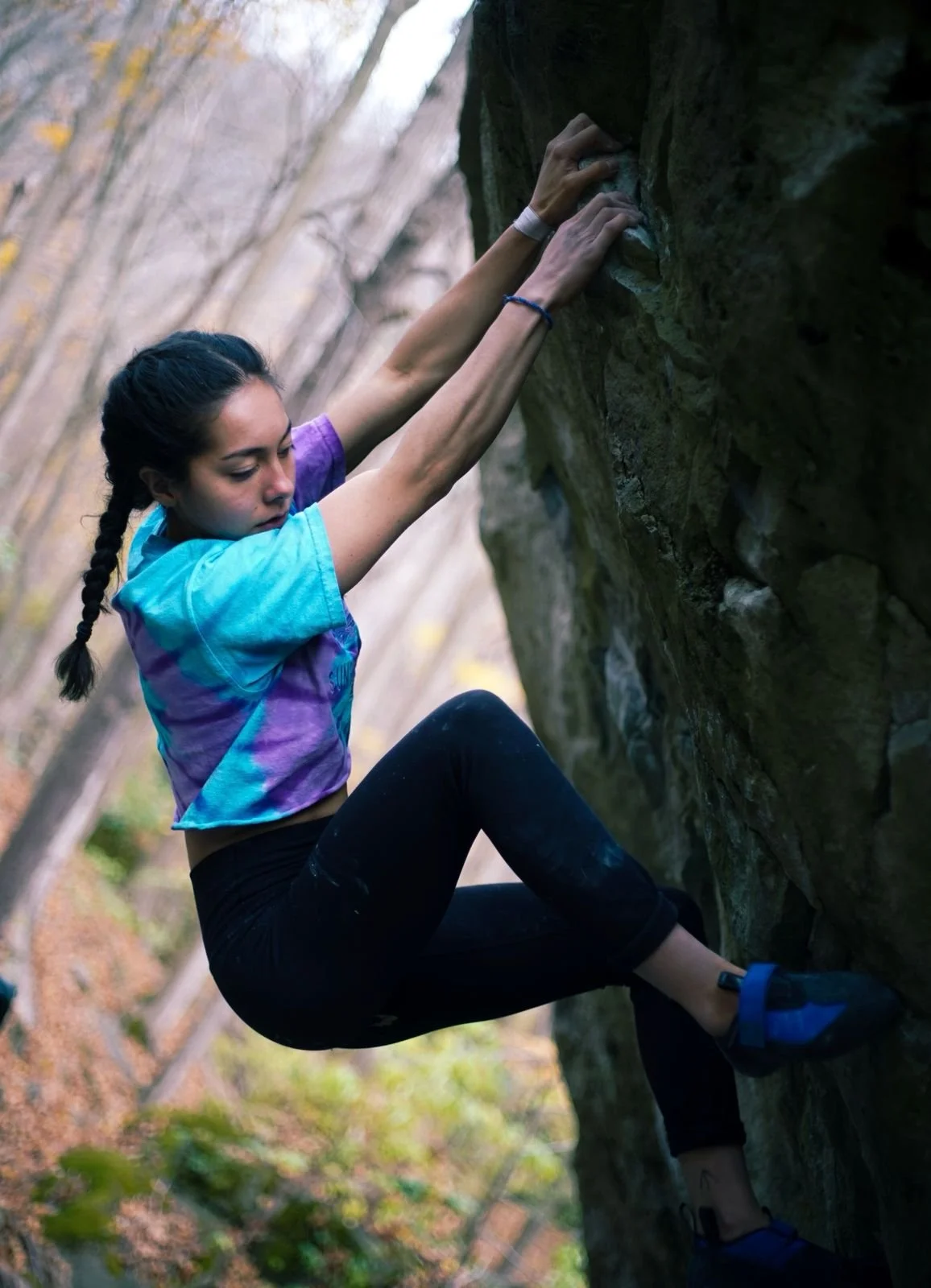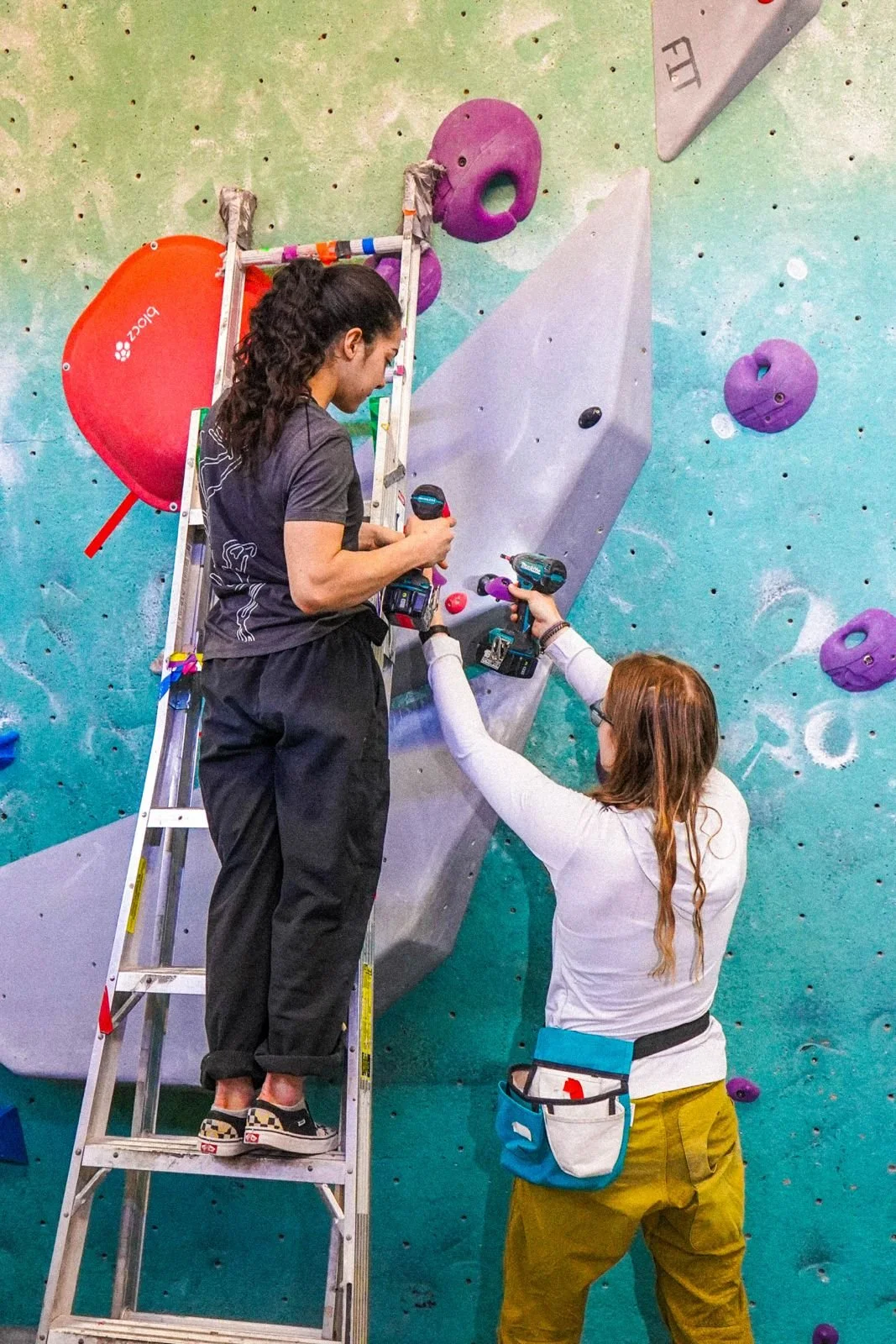Step by step: How Coach Jacquie approaches Climbing and Training
I’ve worked with a few strength coaches so far, and for the past year, I’ve had the privilege of training with Jacquie.
We actually did an interview not long ago about my own journey in climbing and coaching (you can find it here), so I thought it would be fun to flip the script and ask her some questions this time.
Jacquie’s psych for climbing is infectious. One of my favourite parts of working with her is how she always emphasises the positives: celebrating the small wins and takeaways from each session, no matter how the week went.
And while she’s an incredibly accomplished climber — with sends up to V12 (including the FFA of Young Thugs at Niagara Glen), two V10 flashes, and a provincial championship title — her focus is firmly on the process over the outcome.
In this conversation, she shares her perspective on training, mindset, and what it really takes to keep progressing in climbing, from letting go of old beliefs to finding flow on the wall, and what she’d say to anyone considering coaching.
What’s a belief about training or performance you used to hold… that you’ve now let go of?
I used to believe I needed to feel “perfect” and that everything needed to align for me to perform well/send my project. On days when something felt off, big or small, I would write myself off before even warming up and trying my project. If my skin was thin, or I routeset the day before, or I felt a little fatigued, I’d tell myself there was no way I could perform feeling like this.
A lot of the time, I’d show up despite the lack of self-confidence, and more often than not, I would surprise myself. I’ve sent many projects when the conditions were far from ideal, and over time, the connection I drew between feeling perfect and performing well began to fade.
Nowadays, I understand that it’s about showing up consistently, especially on the days when you are doubting yourself. I remind myself that the only thing I can do is try my best, and even if I don't send or meet my goal, I can still be proud of myself for showing up. Of course, this does not mean we don’t listen to our body or push through pain; there is a happy medium.
“At every grade, I doubted whether or not I could send a climb to the next grade.”
Did you always believe you’d climb (and flash!) double-digit boulders? What would you say to past Jacquie to make her journey a little smoother?
Definitely not! At every grade, I doubted whether or not I could send a climb to the next grade. However, climbing has always been more about the process and experience than getting that next number for me. Grade chasing is fun, don’t get me wrong, and I think grades can be good markers of progression. However, if grades were the only reason I climbed, I’d have quit climbing a long time ago. I was stuck at the same grade for 4 years!
Thinking back on my climbing journey, I had (and still have) big goals, but I have the most fun and feel the most satisfied in my training and progression when I am focused on the next step or the short-term goals. I have had many sessions and moments where I’ve felt disheartened because I don’t think I’m where I should be, I feel behind, or like I have so much work to do… Now I am better at recognizing those thoughts when they arise and reminding myself that they do not serve me.
To answer the question, I would tell past Jacquie to keep trusting and focusing on the process. Stay focused on your goals, but do not fixate on them. You will make more progress and stay consistent if you enjoy your training and climbing. It’s not supposed to feel like a slog.
Is there a particular climb that stands out because you found flow on it? What do you remember about that experience?
I’ve experienced flow on quite a few projects I sent.
The send that stands out the most is Seppuku at the Niagara Glen. I remember trying it second day on, so I was expecting to feel tired. Going into that session, I did not think I was ready to send. I had not figured out my beta for the crux.
But that session, I surprised myself by doing the crux sequence pretty quickly, and after some rest, I decided to go for a send burn. I got on the wall, and felt surprisingly good through the start moves, then I got to the crux, barely stuck the mini pinch, cut loose, got my feet back on, and threw for the final jug before the top out.
I then found myself rocking over and climbing up the finishing easy slab section. I had never experienced this feeling before; it was an out-of-body experience, yet simultaneously, my brain and body had never felt more connected.
What helps you maintain a positive mindset in your climbing? And how do you see that impacting your performance?
To maintain a positive mindset while climbing, I surround myself with others who motivate me and are fun to be around. Projecting can be frustrating and demoralizing, being that most of our sessions are spent falling. Being around friends who are also pushing themselves, falling, and having a good time doing so can make the whole process much smoother and more enjoyable.
I also try to practice objectivity; Whenever I fall, it is not failing (not that failing is a bad thing), it is putting in another “rep”. With every rep, I learn something new, get more practice, and my body becomes more efficient. I haven’t always viewed climbing through this lens; I used to become easily frustrated and would let my experience on one climb, or even move, dictate my entire session. However, since adopting this new mentality, climbing is a lot more fun, and I’ve been able to see better progression because I acknowledge the wins, big or small.
Alongside coaching, Jacquie leads the setting team at Hogtown Boulders in Toronto.
How do you personally bounce back from a bad session?
To bounce back from bad sessions, I remind myself that those types of sessions are part of the process. I like the concept of the rule of thirds, popularized by Olympian Alexi Pappas, so many athletes have likely heard of this: one third of your sessions will be good, one third will be okay, and one third will be bad.
Our bodies are not fixed entities; we are always evolving. One bad session does not determine your progress. It can also help to draw the line between training and performance sessions. When you are in the gym training towards a goal, you’re not really meant to feel good all the time or see linear progress from one session to the next. Training at your limit is supposed to be hard, and sometimes all this failing can be frustrating, but it means you are pushing the needle forward. And if you have been pushing hard for a while, it’s natural for fatigue to build up.
What would you say to someone hesitant to work with a coach, whether for strength, movement, or mindset?
I think that if you haven’t worked with a coach, it’s something that can be super valuable. No matter your level of experience or grade, it can be helpful to talk to someone about your current approach, get a coach’s eyes on your climbing, and gain a new perspective.
Connect with Jacquie:
Website: Atomique Coaching | Instagram: @jacqweeeee | YouTube: Jacquie Des Rosiers



